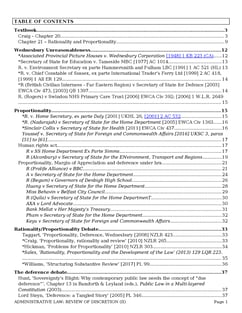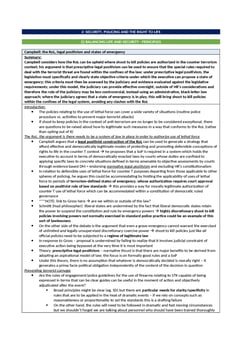R v Home Secretary ex parte Khawaja [1984] AC 74 (HL)
Judgement for the case R v Home Secretary ex parte Khawaja
Table Of Contents
KEY POINTS
“The expression "illegal entrant" is not limited to persons who have entered the country clandestinely, but that it includes also any person who has obtained leave to enter by practising fraud or deception in contravention of section 26(l)(c) of the Act of 1971.” [11]
-
The grounds for deportation of a non-patrial are:
that "having only a limited leave to enter or remain, he does not observe a condition attached to the leave or remains beyond the time limited by the leave": section 3(5)(a);
that "the Secretary of State deems his deportation to be conducive to the public good": section 3(5)(6); and
that he has been recommended for deportation by a court on conviction of an offence punishable with imprisonment: section 3(6). [84]
Courts shall refrain from overturning the determinations of statutory authorities, unless a demonstrated legal error, a violation of the principles of natural justice, or a conspicuously unreasonable conduct by the authority is evident.
When the authority has conscientiously taken into account the relevant considerations, while disregarding extraneous matters, the decision in question generally lies beyond the purview of judicial review, except in circumstances where it is so patently irrational that no reasonable authority could have arrived at such a conclusion.
This legal doctrine precludes the judiciary from supplanting its own interpretation of the facts in place of that rendered by the competent authority.
FACTS
The appellant, Khera, is an Indian citizen born on 21 August 1956, subject to immigration control under the Immigration Act 1971 in the UK. His father, a British Ministry of Defence police officer in Singapore from 1951 to 1971, registered him as a citizen of the United Kingdom and Colonies in February 1961.
In 1972, Khera's father applied for entry certificates for Khera and his mother to the UK, where the father had settled in June 1972. In January 1973, Khera, at the age of 16½, got married in India, a detail that became significant later.
Initially, Khera and his mother faced entry refusals to the UK on the grounds of their relation to the father. However, after appealing, they were granted indefinite leave to enter in January 1975. In November 1978, due to an application from Khera's wife to enter the UK with their children, Khera's marriage came to light. Consequently, he was detained as an illegal entrant.
The detention order was made on 22 November 1978, but he was detained for only about a fortnight. On 8 December 1978, he was temporarily admitted to the UK with certain restrictions on residence. Despite his temporary admission, the appeal has been treated as if he were still detained, given the continued restriction on his personal liberty.
JUDGEMENT
Appeal of Khawaja dismissed. Appeal of Khera allowed.
COMMENTARY
This case underscores the need to balance national security with individual rights and the importance of adhering to procedural fairness and lawful decision-making by government authorities.
ORIGINAL ANALYSIS
The question was whether the court would interfere with the orders of Immigration officers to deport two apparently illegal entrants under the Immigration Act.
HL said that a reviewing had a duty to inquire whether there had been sufficient evidence to justify the immigration officer's belief that the entry had been illegal and that the duty of the court was not limited to inquiring merely whether there was some evidence on which the immigration officer had been entitled to decide as he had.
In judicial review, the home office had to prove on balance of probabilities that Plaintiffs were illegal entrants.
Lord Bridge
If an assessment of the facts and their application to the state of affairs were not subjected to rigorous judicial review, then under this statute the immigration officer could detain and deport a person without their having any prospect of a trial to establish whether or not they actually are illegal.
Only under the plainest statutory language would a court allow the executive to imprison someone without trial.
----
Doesn’t answer the question, regarding whether the statutory criteria have been fulfilled, of when deference should be shown or when a more rigorous approach should be used. Hare, in “The Golden Metwand and the Crooked Cord”, argues that deference should only be granted in accordance with constitutional principle e.g. if the exec has specialist knowledge in an area.
Alternatively, maybe we could look to statutory construction and parliamentary intention (i.e. if the criteria are vague then Parliament must have intended DM to have a wide discretion)
For Further Study on R v Home Secretary ex parte Khawaja

Administrative Law notes fully updated for recent exams at Oxford an...
Need instant answers? Our AI exam tutor is here to help.
Ask questions 🙋 Get answers 📔 It's simple 👁️👄👁️
Our AI is educated by the highest scoring students across all subjects and schools. Join hundreds of your peers today.
Get StartedSimilar Cases
Related Product Samples
These product samples contain the same concepts we cover in this case.
| Criminal Justice, Security, & Human Rights | Fair Trial Rights And Secret Evidence Notes (117 pages) |
| Administrative Law | Jurisdiction Notes (26 pages) |

